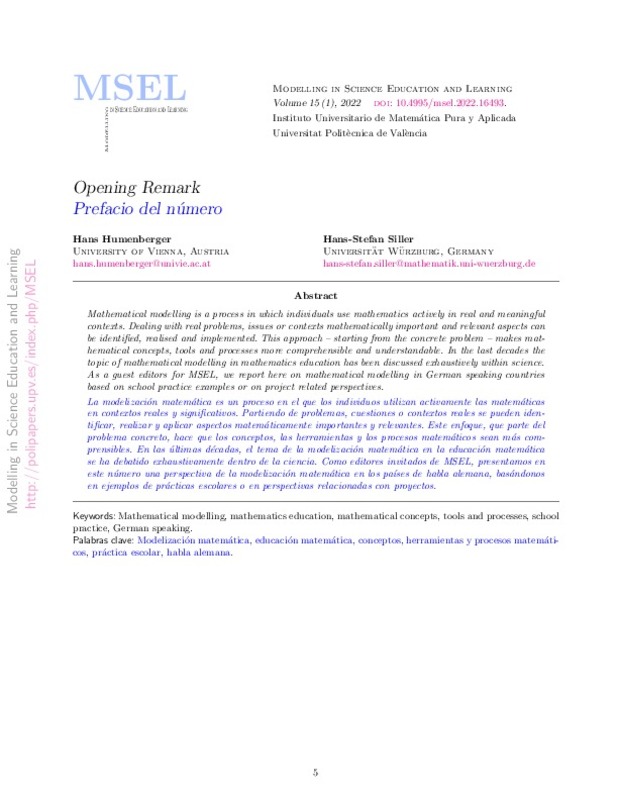JavaScript is disabled for your browser. Some features of this site may not work without it.
Buscar en RiuNet
Listar
Mi cuenta
Estadísticas
Ayuda RiuNet
Admin. UPV
Opening Remark
Mostrar el registro sencillo del ítem
Ficheros en el ítem
| dc.contributor.author | Humenberger, Hans
|
es_ES |
| dc.contributor.author | Siller, Hans-Stefan
|
es_ES |
| dc.date.accessioned | 2022-02-01T09:15:06Z | |
| dc.date.available | 2022-02-01T09:15:06Z | |
| dc.date.issued | 2022-01-29 | |
| dc.identifier.uri | http://hdl.handle.net/10251/180414 | |
| dc.description.abstract | [EN] Mathematical modelling is a process in which individuals use mathematics actively in real and meaningful contexts. Dealing with real problems, issues or contexts mathematically important and relevant aspects can be identified, realised and implemented. This approach – starting from the concrete problem – makes mathematical concepts, tools and processes more comprehensible and understandable. In the last decades the topic of mathematical modelling in mathematics education has been discussed exhaustively within science. As a guest editors for MSEL, we report here on mathematical modelling in German speaking countries based on school practice examples or on project related perspectives. | es_ES |
| dc.description.abstract | [ES] La modelización matemática es un proceso en el que los individuos utilizan activamente las matemáticas en contextos reales y significativos. Partiendo de problemas, cuestiones o contextos reales se pueden identificar, realizar y aplicar aspectos matemáticamente importantes y relevantes. Este enfoque, que parte del problema concreto, hace que los conceptos, las herramientas y los procesos matemáticos sean más comprensibles. En las últimas décadas, el tema de la modelización matemática en la educación matemática se ha debatido exhaustivamente dentro de la ciencia. Como editores invitados de MSEL, presentamos en este número una perspectiva de la modelización matemática en los países de habla alemana, basándonos en ejemplos de prácticas escolares o en perspectivas relacionadas con proyectos. | es_ES |
| dc.language | Inglés | es_ES |
| dc.publisher | Universitat Politècnica de València | es_ES |
| dc.relation.ispartof | Modelling in Science Education and Learning | es_ES |
| dc.rights | Reconocimiento - No comercial (by-nc) | es_ES |
| dc.subject | Mathematical modelling | es_ES |
| dc.subject | Mathematics education | es_ES |
| dc.subject | Mathematical concepts | es_ES |
| dc.subject | Tools and processes | es_ES |
| dc.subject | School practice | es_ES |
| dc.subject | German speaking | es_ES |
| dc.subject | Modelización matemática | es_ES |
| dc.subject | Educación matemática | es_ES |
| dc.subject | Conceptos | es_ES |
| dc.subject | Herramientas y procesos matemáticos | es_ES |
| dc.subject | Práctica escolar | es_ES |
| dc.subject | Habla alemana | es_ES |
| dc.title | Opening Remark | es_ES |
| dc.title.alternative | Prefacio del número | es_ES |
| dc.type | Artículo | es_ES |
| dc.identifier.doi | 10.4995/msel.2022.16493 | |
| dc.rights.accessRights | Abierto | es_ES |
| dc.description.bibliographicCitation | Humenberger, H.; Siller, H. (2022). Opening Remark. Modelling in Science Education and Learning. 15(1):5-8. https://doi.org/10.4995/msel.2022.16493 | es_ES |
| dc.description.accrualMethod | OJS | es_ES |
| dc.relation.publisherversion | https://doi.org/10.4995/msel.2022.16493 | es_ES |
| dc.description.upvformatpinicio | 5 | es_ES |
| dc.description.upvformatpfin | 8 | es_ES |
| dc.type.version | info:eu-repo/semantics/publishedVersion | es_ES |
| dc.description.volume | 15 | es_ES |
| dc.description.issue | 1 | es_ES |
| dc.identifier.eissn | 1988-3145 | |
| dc.relation.pasarela | OJS\16493 | es_ES |
| dc.description.references | Blomhøj M. & Højgaard Jensen, T. (2003). Developing mathematical modelling competence: Conceptual clarification and educational planning. Teaching Mathematics and its applications: An International Journal of the IMA, Volume 22, Issue 3, September 2003, Pages 123-139. https://doi.org/10.1093/teamat/22.3.123 | es_ES |
| dc.description.references | Bruder R. (2001). Mathematik lernen und behalten. Heymann, H.-W. (Hrsg.), Lernergebnisse sichern. Padagogik, 53 (2001), H. 10, S. 15-18. | es_ES |
| dc.description.references | Carreira S. & Blum W. (Eds., 2021a). Mathematical modelling in the teaching and learning of mathematics: Part 1. Quadrante: Revista de Investigaçao em Educaçao Matemática 30(1) 1-7. https://doi.org/10.48489/quadrante.24926 | es_ES |
| dc.description.references | Carreira S. & Blum W. (Eds., 2021b). Mathematical modelling in the teaching and learning of mathematics: Part 2. Quadrante, 30(2), p. 1-8. https://doi.org/10.48489/quadrante.26132. | es_ES |
| dc.description.references | Kaiser G. & Schukajlow S. (Eds., 2022). Innovations in measuring and fostering modelling competencies. | es_ES |
| dc.description.references | Kaiser G., Schukajlow S. and Stillman G (Eds., 2022). A psyccologically-driven view on mathematical modelling processes. Mathematical Thinking and Learning. | es_ES |
| dc.description.references | Winter H. (1995). Mathematikunterricht und Allgemeinbildung. Mitteilungen der Gesellschaft f¨ur Didaktik der Mathematik. Nr. 61, S. 37-46. | es_ES |








